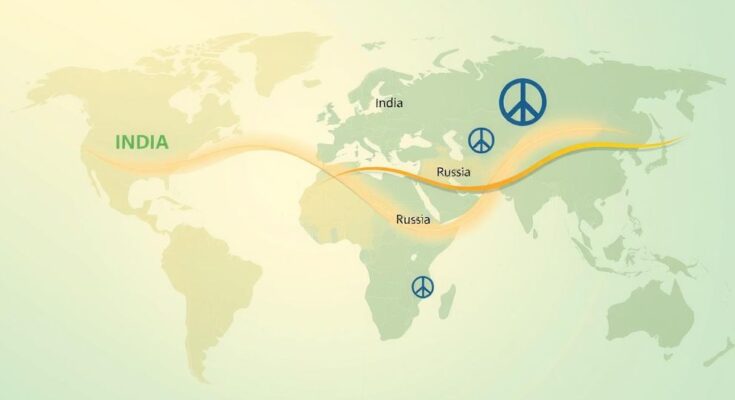The study reflects Indian public opinion on the Russia-Ukraine conflict, revealing that 27% view Russia’s actions as necessary while 34% find them unjustified. Awareness varies significantly with educational levels, where those with higher education tend to be more critical of Russia. Exposure to Western media also influences opinions, with varying perspectives across different urban sizes. Overall, socio-economic and cultural factors shape these complex views.
The ongoing Russia-Ukraine war profoundly influences global geopolitics. In India, public opinion remains complex and divided. A survey indicated that 27% of respondents viewed Russia’s actions as necessary, while a larger group, 34%, found them unjustified. Alarmingly, 23% of individuals were unaware of the situation, revealing a significant gap in knowledge about international affairs. Additionally, 16% chose not to express an opinion, showcasing the diversity of views among the Indian populace.
Education plays a crucial role in shaping opinions regarding the war. Among individuals with minimal education, 42% were unaware of the conflict, while only 19% deemed Russia’s actions unjustified. In contrast, those with intermediate education reflected a more split view, with 27% believing the actions were necessary and 24% finding them unjustified. Remarkably, among college-educated respondents, 41% criticized Russia’s actions, demonstrating a stronger engagement with global issues and a higher awareness of the conflict.
The level of exposure to Western media also emerged as a key factor impacting Indian perspectives on the conflict. Respondents with no exposure were more likely to be uninformed about the issue, with 37% expressing no awareness. Conversely, those with moderate exposure often viewed Russia’s actions as unjustified (44%), whereas high exposure respondents presented nearly equal views of necessity (39%) and unjustification (37%). The findings suggest that Western media influences public perception and understanding of international conflicts.
The study examined opinions across various city sizes, revealing noteworthy differences. Respondents from smaller cities were the most critical, with 41% considering Russia’s actions unjustified, compared to 31% in mid-sized cities and big cities. The data indicates a polarized discourse in urban environments, reflecting diverse opinions shaped by socio-economic and cultural factors, which significantly affect perceptions of international issues.
Ultimately, these findings illustrate the intricate landscape of Indian public sentiment regarding the Russia-Ukraine conflict. Socio-economic and educational factors play pivotal roles in shaping these opinions, contributing to a rich and diverse discourse within Indian society as it navigates the complexities of global affairs.
In conclusion, Indian perspectives on the Russia-Ukraine conflict exemplify a complex interplay of awareness, education, and exposure to media. While opinions vary significantly based on educational background and urban context, a notable proportion of the populace remains uninformed. These insights underscore the importance of fostering greater awareness and critical engagement with international events in India.
Original Source: www.thehindu.com




